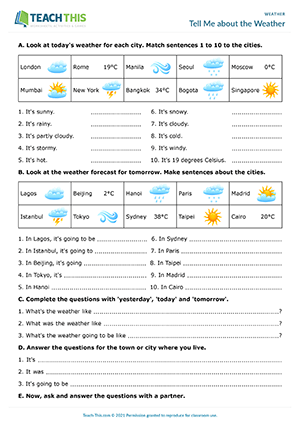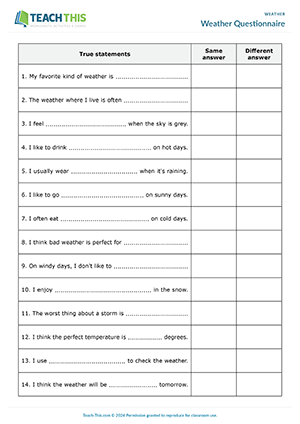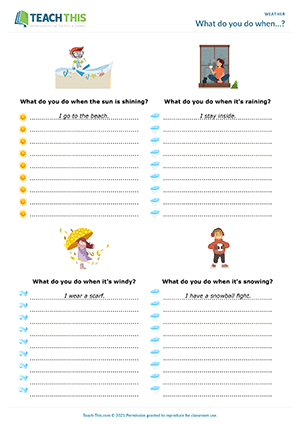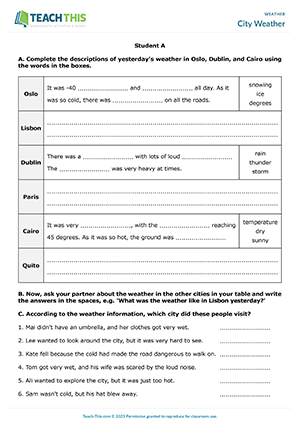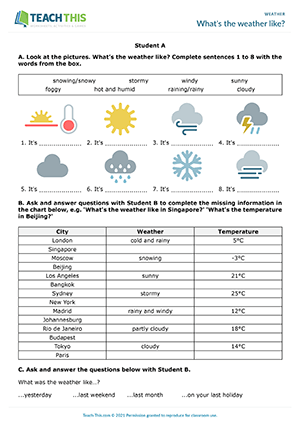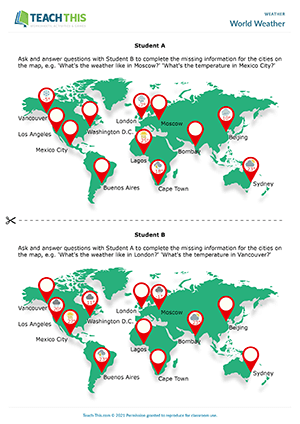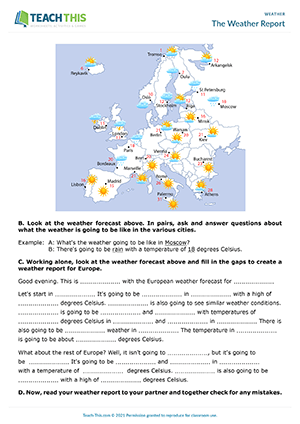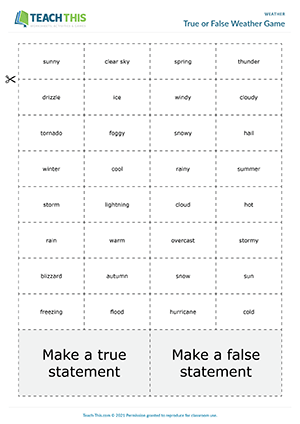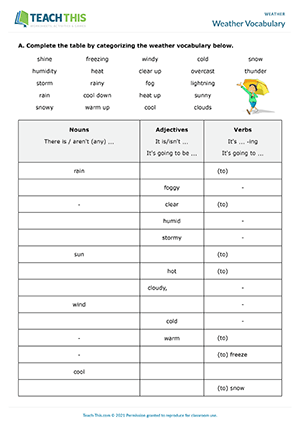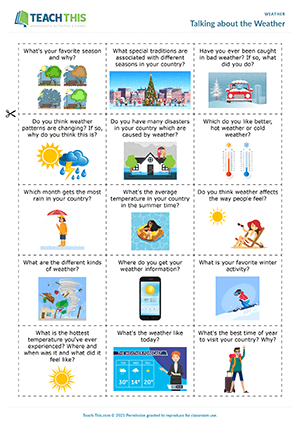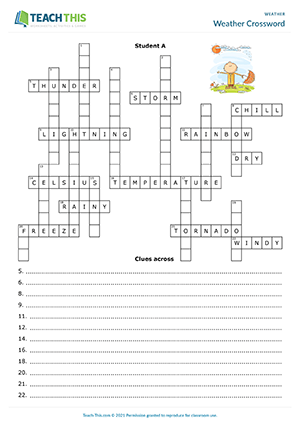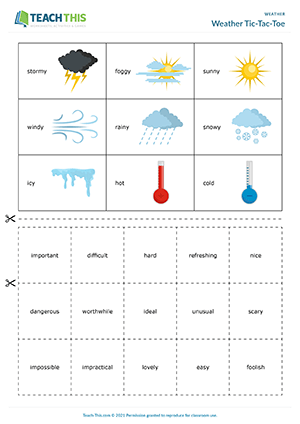This productive weather adjective worksheet helps to teach students how to talk about the weather using weather adjectives and ask and answer questions about the weather. To begin, students look at today's weather in ten cities and match sentences containing weather adjectives to the cities. In pairs, students then take it in turns to ask their partner what the weather is like in the cities, e.g. 'What's the weather like in Bangkok?' After that, students look at tomorrow's weather forecast for ten new cities and write sentences about the weather using be going to. Finally, students complete questions and answers about the weather for yesterday, today and tomorrow and practice asking and answering the questions in pairs.
In this weather questionnaire activity, students practice asking and answering weather-related questions. First, students complete weather-related statements with true information. Next, explain that for each statement, students are going to try to find someone with the same answer and someone with a different answer. Elicit the Wh question that students need to ask for each statement, e.g. 'What's your favourite kind of weather?' Students then go around the class, asking and answering the weather-related questions. When a classmate replies with the same answer as the student has written in their statement, the student writes their classmate's name in the 'Same answer' column. If the answer is different, the student writes their classmate's name and response in the 'Different answer' column. The first student to complete both columns with names is the winner.
In this imaginative weather game, students write and talk about what they do when it's sunny, rainy, windy and snowy and score points for matching answers. First, students write about what they do when it's sunny, rainy, windy and snowy using the present simple tense. In groups of four, students then take it in turns to ask the other people in their group a question from the worksheet, e.g. 'What do you do when the sun is shining?' The other students each reply by reading one of their sentences. If a student has a matching sentence, they score one point. The student with the most points at the end of the game wins. This worksheet can also be used as a stand-alone writing activity.
This useful weather activity helps students practice vocabulary related to weather. First, in two groups, students complete descriptions of yesterday's weather in three cities using weather vocabulary in boxes. Next, students pair up with someone from the other group and take turns asking their partner about the weather in the other cities in their table, writing the answers in the spaces, e.g. 'What was the weather like in Oslo yesterday?' Afterwards, students write down which city six people visited based on the weather information in the table.
In this engaging talking about the weather activity, students learn weather vocabulary and practice asking and answering questions about the weather. First, students look at pictures and complete sentences with weather words from a box. Next, students complete missing weather information in a chart by asking and answering questions with a partner, e.g. 'What's the weather like in Singapore?' Afterwards, students ask and answer questions about what the weather was like in the past with their partner.
In this rewarding world weather speaking activity, students learn weather adjectives and practice asking and answering questions about the weather in various cities around the world. In pairs, students complete missing information on a weather map on their worksheet by asking and answering questions with their partner. When the students have finished, review the answers with the class.
In this handy weather report activity, students practice weather vocabulary and the future form be going to to talk about weather forecasts. First, students look at a weather forecast picture and read an example weather report to review the three be going to structures used to talk about the weather. In pairs, students then look at a second weather forecast picture and practice asking and answering questions about what the weather is going to be like in the various cities on the map. After that, students look at the weather map and fill in gaps in a text to create a weather report for Europe. When the students have finished, they read their weather report to their partner and check for any mistakes. Finally, students present their weather reports to the class.
Here is a fun weather game that students can play to help them practice weather vocabulary. Players take it in turns to turn over a weather vocabulary card for everyone to see. Next, the player picks up a true or false card and makes a true or false statement as indicated on the card using the weather vocabulary on the table. For example, if the weather word was 'sunny', the player might say 'When it's sunny, I like to go to the park'. The other students then each ask a question to the player to determine whether they are lying or telling the truth. After the questions have been answered, students say whether they think the statement is true or false. The player then reveals the answer. Students who guessed correctly each score one point. The student with the most points at the end of the game is the winner.
In this comprehensive weather worksheet, students identify and practice using weather adjectives, verbs and nouns. Students begin by categorizing weather vocabulary into adjectives, verbs and nouns. Next, students correct mistakes in weather vocabulary usage and rewrite sentences. In the last exercise, students complete a weather report with weather words in brackets.
Here is a free weather conversation questions activity to help students practice talking about the weather. Students take it in turns to pick up a card and ask the other students in their group the weather conversation question on the card. Each student responds to the question in turn and students then discuss the weather topic. When the students have finished, they give feedback to the class on their answers.
In this enjoyable describing weather activity, students complete a crossword by describing and guessing words related to weather. In two groups, students invent and write down clues for the weather words on their crossword. Students then pair up with someone from the other group and take it in turns to ask their partner for a clue to one of their missing words. Their partner reads out the clue for that weather word and the other student tries to guess what it is. If the student guesses the word successfully, they write it on their crossword. If not, their partner continues to give more clues until the student is able to guess the word. When the students have finished, they check their spelling by comparing crosswords.
In this creative weather game, students play Tic-Tac-Toe by making sentences about different weather conditions using adjectives that use an infinitive clause. In pairs, students take it in turns to pick up an adjective card and choose a weather word from the grid, e.g. cold / important. The student then tries to make a sentence using the weather word and adjective with the target structure, e.g. 'When it's cold, it's important to wear warm clothes'. If the student manages to do this, they mark the square with an O or X. If not, play passes to the other student. The first student to get three squares in a row wins the round and scores a point. Students play several rounds. The student with the most points at the end of the game wins.
Latest Free
Resources
- Everyday Objects Bingo
Everyday Objects
Elementary (A1-A2)
- Action Verb Races
Actions
Elementary (A1-A2)
- Birthday Basics
Birthdays
Elementary (A1-A2)
- Sales Phrasal Verbs
Business Phrasal Verbs
Upper-intermediate (B2)
Latest Member
Resources
- Collocations at Work
Business Collocations
Intermediate (B1)
- Etiquette Trivia Board Game
Etiquette and Manners
Upper-intermediate (B2)
- Everyday Objects Vocabulary
Everyday Objects
Pre-intermediate (A2)
- Let's have a talk
Verb-Noun Collocations
Pre-intermediate (A2)



